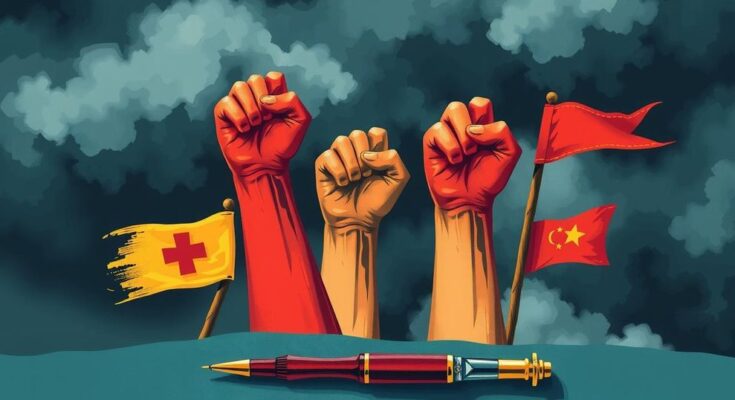The Council of Europe’s Commissioner for Human Rights, Michael O’Flaherty, is sounding the alarm for enhanced human rights protections in Georgia. His recent memorandum, published on March 26, reveals significant concerns regarding the current human rights climate and outlines specific recommendations for the government, urging a commitment to democratic values, accountability for law enforcement actions, and safeguarding fundamental rights like assembly and expression. This memorandum follows his January visit to the nation.
The report sheds light on serious human rights violations amidst mass protests in late 2024 and early 2025. Notably, the Public Defender’s Office recorded numerous cases of detained individuals, including 225 who reported mistreatment in police custody. It draws attention to instances of physical abuse and threats against female protesters, exacerbated by failures to inform families about arrests. Detainees also reported losing their mobile phones during their detention without recovery. The findings suggest a systematic pattern of torture and mistreatment of protesters.
Simultaneously, the memorandum highlights alarming restrictions on press freedom, documenting at least 91 incidents where journalists faced barriers in their work. Journalists were reportedly assaulted, subjected to water cannons, and endured equipment destruction, which aligns with the CoE’s findings of a troubling uptick in journalist attacks in Georgia, witnessing a tripling of incidents from the previous year. The report argues that isolated instances of protest violence do not justify the suppression of peaceful assemblies and condemns law enforcement for disproportionate responses to peaceful pro-EU protests.
A concerning aspect of these protests is the apparent impunity for law enforcement involved in human rights violations, as documented by the lack of necessary identification of masked officers during demonstrations. Despite discussions about this issue, the report highlights that investigations into police misconduct remain infrequent, and no prosecutions have occurred regarding past abuses.
In addition to police actions, the memorandum criticises new legislative measures that impose stricter controls on freedom of assembly, such as face-covering bans and increased penalties for protests. These changes, made without proper consultation or impact assessment, appear inconsistent with international human rights standards. The memorandum mentions the troubling case of jailed journalist Mzia Amaghlobeli, asserting the need for Georgia to bolster freedom of expression and assembly rights.
Among its numerous recommendations, the report insists that Georgian authorities should ensure accountability for human rights violations, uphold the rights of protesters, and conduct independent investigations of malpractice. Furthermore, it urges the unconditional release of protesters held for expressing their rights, as well as reparations for victims.
The report expresses grave concerns about the treatment of civil society in Georgia, describing efforts to discredit NGOs and human rights defenders, which have faced physical attacks and smear campaigns. Additionally, a recent decision to cease mandatory CSO participation in public decision-making raises alarms. The Commissioner implores Georgian officials to halt the stigmatization of civil society and reaffirm their legitimacy.
Significantly, the memorandum addresses the detrimental anti-LGBTI law enacted in September 2024, which bans legal gender recognition and criminalizes trans-specific healthcare. While GD officials allege the law upholds traditional values, it has only served to entrench discrimination and hinder healthcare access for LGBTI individuals. The Commissioner calls for the repeal of this law and for authorities to cease the public stigmatization of LGBTI people, fulfilling obligations to protect their rights as established by international standards.
Michael O’Flaherty, Commissioner for Human Rights at the Council of Europe, has urged stronger protections for human rights in Georgia, reflecting on recent abuses during protests and calls for accountability from law enforcement. His memorandum details systemic mistreatment of protesters, assaults on journalists, and new laws restricting freedom of assembly. Additional calls for the protection of civil society and LGBTI rights are emphasised, highlighting the urgent need for meaningful reforms and adherence to international standards.
In summary, Michael O’Flaherty’s memorandum underscores a pressing need for robust human rights protections in Georgia, highlighting numerous violations against protesters and journalists, as well as significant legislative restrictions on freedom of assembly. The lack of accountability for law enforcement and ongoing attacks on civil society and LGBTI individuals further threaten the foundations of democracy in the country. Recommendations for more humane governance include ensuring the safety of journalists, independent investigations into abuses, and a commitment to the principles of equality and non-discrimination. The urgent call for action comes as Georgia navigates a precarious human rights landscape, facing scrutiny from both national and international communities. Only through immediate and decisive steps can the government begin to restore its commitment to human rights and democracy.
Original Source: civil.ge



